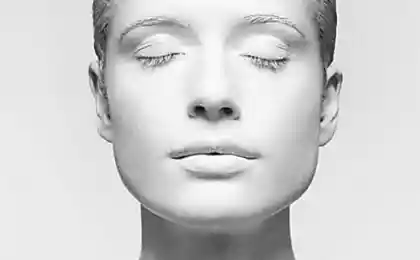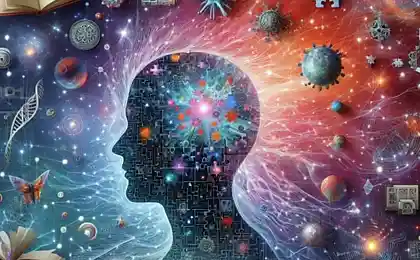531
Psychological protection of the personality From Crowding to Emotional Isolation
Psychological defense is probably one of the most controversial phenomena of the human psyche. On the one hand, it stands guard over our "I", protecting it from stress, anxiety, negative thoughts, internal and external conflicts. On the other may act destructively and not allow the individual to grow and develop to achieve success, discover new opportunities, create and enjoy life.
Three million one hundred ninety three thousand three hundred eighty eight
Psychological defense mechanisms are formed in early childhood. Their set is different for each person and is matched to his temperament, parenting style, parent-child and intra-family relations (grandmothers, grandfathers, aunts, uncles, and other parental figures).
It is proved that the greatest influence on the formation of protective mechanisms have a negative and significant adults, which caused the child fear and anxiety. It is these experiences and feelings are the direct sources of the supply of psychological protection of the individual and involve internal or external conflicts.
There are entire defensive strategy, which Transactional Analysis considers how games. Their main purpose is not to allow the awareness of information about yourself and your partner, which could threaten the established relationship. In fact, it is the playing strategies of building relationships in the parent family responses to stressful situations, which allowed to avoid true intimacy (trust, open communication about feelings, thoughts, behavior, and motives of actions between partners).
All protective mechanisms have two common characteristics: they operate on the unconscious level and are therefore self-deception. They distort, deny, transformerait or falsifiziert perception of reality to make the anxiety or fear is less threatening to humans.
Today there are more than twenty types of protective mechanisms. Most of them are listed in this article.
Looking through a list of psychological defenses, You will inevitably encounter those that are common to You personally. I suggest not to react too emotionally. Remember that, as a rule, the protective mechanisms of the person are not recognized and to recognize them only well-trained specialist who has studied their or he came across them in personal psychotherapy.
The types of protective mehanizirovannaya. Using this mechanism unacceptable human impulses: desires, thoughts, feelings, worrying, become unconscious. People can easily forget some things, especially those that reduce self-esteem. All, forced out of consciousness into the unconscious, non-fading and has a definite influence on human behavior. From time to time there is a spontaneous "return of the repressed" at the level of consciousness, which takes the form of dreams, faulty actions of the reservations.
Deflexa (deviation) – unconscious mechanism of care cessation of contact and increased isolation of the individual, both from others and from his own experience. People abstrahierte from the situation, let the replica is not on the merits.
This mechanism often occurs as a result of mistrust, fear, security threats that occurred in the past and protects him from emotional breakdowns. Externally, delexe can manifest in the avoidance of eye contact, constant motion, marking time, etc.
Substitution – satisfaction or suppression unmet (often sexual) desires with another object. For example, sexual attraction to unavailable person can be satisfied a person is more affordable.
Identification – an increased sense of self-importance by identifying themselves with outstanding personalities.
Intreccia – inclusion in the structure of the ego external values and standards so that they ceased to operate as an external threat. Granting the qualities of other people. This mechanism is opposite to the mechanism of projection.
Internalization. This discharge mechanism is easiest to describe with the phrase "Not really wanted". If you can't achieve a desired result, sometimes it is easier to convince yourself that you don't need it.
Intellectualization – repress the emotions caused by an unpleasant situation or regulation is incompatible installations with the help of logical manipulation. Commitment to certain values and attitudes even when there is clear evidence in favor of the opposite units.
Compensation – attempt to hide their own weaknesses by underlining the desired traits or overcoming unpleasant feelings in one area of sverhodarennym in other areas. For example, a person who can't play football, becoming an outstanding chess player.
Catharsis – the protection inherent in this change of values, which leads to a weakening of the influence of traumatic factors. To do this, as the facilitator is sometimes involved some external, global system of values, in comparison with which traumatic human situation loses its significance.
Changes in the structure of values can occur only in the process of strong emotional tension, the passions. The system of human values is very inertial, and it resists change until then, until there is irritation so powerful or not so appropriate all the cash system of norms and ideals of the person that they will break the protective barrier all other forms of psychological defense.
Catharsis brings a cleansing effect. It is a means of protecting the individual against unbridled impulses (a kind of valve, saving from primitive instincts), and how the new areas of aspiration for the future.
The mechanism of disease care or education of symptoms. Care symptoms, the disease is a kind of solution to unsolvable problems in the life of the individual. As told to psychoanalysts. for their inability and their powerlessness to change anything in my life the person finds somatic expression. In the formation of disease care the patient refuses responsibility and independent problem-solving, disease justifies its failure, seeking care and recognition playing the role of the patient.
Denial is not seeing everything. Usually it is about personal characteristics of themselves or important people. The mechanism of denial operates on the principle that "if I do not recognize, so it's not happened." Unwanted events are not accepted by consciousness. Denial is often the first response to irreversible events — death or serious illness.
Offset – discharge suppressed feelings, usually feelings of hostility directed at the object less dangerous than the one that caused negative emotions. For example, the chief quarreled with his wife the whole day and vents his anger on his subordinates.
Dreaming is a kind of substitution, which is reoriented, i.e. the transfer of the unavailable actions in that plan: from the real world into the world of dreams. Secret repentance or remorse lead to a breakthrough in their dream.
In the dream is resolved not on the basis of its logical resolution and transformation, which is typical for protection by type of rationalization, and with the help of images. There is a way, reconciling antagonistic the installation and thereby reducing tension. So, the scene crossing the bridge can serve as a metaphor for the need of an important decision or a significant change in life. The drop in tension at the same time eliminates the need for displacement.
Dreams are always something to compensate and complement. And unlike reality, the dream can endow you with supernatural powers and unlimited possibilities.
Suppression – the failure to realize already penetrated into the consciousness of the unpleasant and dangerous thoughts and to formulate them. A classic example is the reasoning of a boy who decides not to stand up for his friend in front of teenagers because he wants to seem to adults, not as young and helpless as his "unwanted" friend.
Projection – shifting of responsibility for difficulties on others or attributing to others their moral qualities and intentions.
So, the deceiver seems to be that all around tend to cheat him, and the person experiencing the lack of money, often tend to blame the poor and beggars.
Can be projected not only negative, but also positive emotions. In a broad sense we all use projection to explain the world — how else can you understand others, but to find similar feelings in yourself?
Discharge – reducing anxiety caused by forbidden desires by its external expressions. This behavior often manifests itself in crime or delinquency (antisocial illegal behavior, embodied in his misconduct (action or inaction), causing damage to both individual citizens and society as a whole).
Rationalization. This protection mechanism involves a compelling reason for insufficient approve of the actions and desires, attempts to prove that the behavior is rational and justifiable, and therefore socially acceptable. What is easier: to admit that you do not take the job that you have always dreamed of, because of insufficient experience or believe in what it prevents, for example, your bright appearance.
Rationalization allows to isolate themselves from the world by a set of simple stereotypes, to spend a minimum of effort on the analysis of incoming information and thus to feel d'artagnan on bleak reality.
Reactive formation is a transparent way of psychological protection are reactive education — when a person makes a substitution of his own feelings on the opposite. Classic examples of reactive entities can be found in the behavior of adolescents, seeking to turn inside out the feelings that they consider shameful. So you have to laugh in movies over the episode that brings tears, or pull the hair of the girl that you like, but scary, "what say the other guys".
Regression. The basis of this protection lies in the objective fact that a young child people generally tend to protect to a greater degree than an adult. Keeping the memories of the sense of security that was most of us in childhood, a person unconsciously uses, at first sight, paradoxical protection from trouble begins to show baby, maladaptive traits and behaviors.
Often, this really leads to the fact that others begin to defend the "defenseless child", but not always, regression can occur even then, when there's just nobody there.
Demonstration of pain, inferiority and helplessness also applies to regression, as it contains the same message: "I am sick. I am not able to take care of themselves. Protect me.» As a result, some people who abuse regression, may develop chronic disease, which in turn can escalate into hypochondria and accompanied by somatization. When regression has become a vital strategy to overcome the problems, such a person is called immature.
Repression – prevention of penetration into consciousness unpleasant and dangerous thoughts.
Retroflexion projection Vice versa. The subject regains that which was addressed to the environment, beats himself on the hand or kicking the chair, instead of hitting someone. The highest form of retroflexive – suicide.
Merger. In this type of protection, the person is completely "dissolved" in the environment, group, or person, renounces his life, his own individuality, needs, carefully avoiding conflicts. In the speech, the sustainable use of the pronoun "we".
Compassion – the desire to win the sympathy of others and thus maintain a sense of dignity, despite setbacks.
Sublimation is the satisfaction or suppression of unsatisfied desires, often sexual in nature, with other activities. Usually this refers to a change in the way of satisfaction, rather than its object. For example, a person who is experiencing strong sexual attraction to another person and not having the opportunity to have that attraction to satisfy, you may find a partial discharge within the allowable actions, e.g. dancing, firewood, game on the bells.
Fantasy – the satisfaction of unfulfilled desires in your mind.
Fantasies can take many forms: conscious fantasies, day-dreams and unconscious fantasies.
A person can escape from a disappointing reality, in virtual computer worlds, the movies, the main feature which is the ability to interact with imaginary ideal "reality."
Formation reactions – a warning of dangerous aspirations by strengthening their opposing attitudes and types of behavior, to use them as "barriers". For example, a person can become a fighter against alcoholism, because his father or other family member was an alcoholic.
Emotional insulation – a closure and passivity for protection from pain and hurt.
Now that you know your psychological defenses, ask yourself: do they matter to You today as it was in early childhood? Or still the time has come to let them go, freeing up space for a new life experience? published
According to the media and Internet publications
Prepared By Ksenia Panyukova
The publication also used the Dissertation on competition of a scientific degree of candidate of psychological Sciences Elena Chumakova.
P. S. And remember, just changing your mind — together we change the world! ©
Source: kseniyapanyukova.com/psixologicheskie-zashhity-lichnosti-ot-vytesneniya-do-emocionalnoj-izolyacii/
Three million one hundred ninety three thousand three hundred eighty eight
Psychological defense mechanisms are formed in early childhood. Their set is different for each person and is matched to his temperament, parenting style, parent-child and intra-family relations (grandmothers, grandfathers, aunts, uncles, and other parental figures).
It is proved that the greatest influence on the formation of protective mechanisms have a negative and significant adults, which caused the child fear and anxiety. It is these experiences and feelings are the direct sources of the supply of psychological protection of the individual and involve internal or external conflicts.
There are entire defensive strategy, which Transactional Analysis considers how games. Their main purpose is not to allow the awareness of information about yourself and your partner, which could threaten the established relationship. In fact, it is the playing strategies of building relationships in the parent family responses to stressful situations, which allowed to avoid true intimacy (trust, open communication about feelings, thoughts, behavior, and motives of actions between partners).
All protective mechanisms have two common characteristics: they operate on the unconscious level and are therefore self-deception. They distort, deny, transformerait or falsifiziert perception of reality to make the anxiety or fear is less threatening to humans.
Today there are more than twenty types of protective mechanisms. Most of them are listed in this article.
Looking through a list of psychological defenses, You will inevitably encounter those that are common to You personally. I suggest not to react too emotionally. Remember that, as a rule, the protective mechanisms of the person are not recognized and to recognize them only well-trained specialist who has studied their or he came across them in personal psychotherapy.
The types of protective mehanizirovannaya. Using this mechanism unacceptable human impulses: desires, thoughts, feelings, worrying, become unconscious. People can easily forget some things, especially those that reduce self-esteem. All, forced out of consciousness into the unconscious, non-fading and has a definite influence on human behavior. From time to time there is a spontaneous "return of the repressed" at the level of consciousness, which takes the form of dreams, faulty actions of the reservations.
Deflexa (deviation) – unconscious mechanism of care cessation of contact and increased isolation of the individual, both from others and from his own experience. People abstrahierte from the situation, let the replica is not on the merits.
This mechanism often occurs as a result of mistrust, fear, security threats that occurred in the past and protects him from emotional breakdowns. Externally, delexe can manifest in the avoidance of eye contact, constant motion, marking time, etc.
Substitution – satisfaction or suppression unmet (often sexual) desires with another object. For example, sexual attraction to unavailable person can be satisfied a person is more affordable.
Identification – an increased sense of self-importance by identifying themselves with outstanding personalities.
Intreccia – inclusion in the structure of the ego external values and standards so that they ceased to operate as an external threat. Granting the qualities of other people. This mechanism is opposite to the mechanism of projection.
Internalization. This discharge mechanism is easiest to describe with the phrase "Not really wanted". If you can't achieve a desired result, sometimes it is easier to convince yourself that you don't need it.
Intellectualization – repress the emotions caused by an unpleasant situation or regulation is incompatible installations with the help of logical manipulation. Commitment to certain values and attitudes even when there is clear evidence in favor of the opposite units.
Compensation – attempt to hide their own weaknesses by underlining the desired traits or overcoming unpleasant feelings in one area of sverhodarennym in other areas. For example, a person who can't play football, becoming an outstanding chess player.
Catharsis – the protection inherent in this change of values, which leads to a weakening of the influence of traumatic factors. To do this, as the facilitator is sometimes involved some external, global system of values, in comparison with which traumatic human situation loses its significance.
Changes in the structure of values can occur only in the process of strong emotional tension, the passions. The system of human values is very inertial, and it resists change until then, until there is irritation so powerful or not so appropriate all the cash system of norms and ideals of the person that they will break the protective barrier all other forms of psychological defense.
Catharsis brings a cleansing effect. It is a means of protecting the individual against unbridled impulses (a kind of valve, saving from primitive instincts), and how the new areas of aspiration for the future.
The mechanism of disease care or education of symptoms. Care symptoms, the disease is a kind of solution to unsolvable problems in the life of the individual. As told to psychoanalysts. for their inability and their powerlessness to change anything in my life the person finds somatic expression. In the formation of disease care the patient refuses responsibility and independent problem-solving, disease justifies its failure, seeking care and recognition playing the role of the patient.
Denial is not seeing everything. Usually it is about personal characteristics of themselves or important people. The mechanism of denial operates on the principle that "if I do not recognize, so it's not happened." Unwanted events are not accepted by consciousness. Denial is often the first response to irreversible events — death or serious illness.
Offset – discharge suppressed feelings, usually feelings of hostility directed at the object less dangerous than the one that caused negative emotions. For example, the chief quarreled with his wife the whole day and vents his anger on his subordinates.
Dreaming is a kind of substitution, which is reoriented, i.e. the transfer of the unavailable actions in that plan: from the real world into the world of dreams. Secret repentance or remorse lead to a breakthrough in their dream.
In the dream is resolved not on the basis of its logical resolution and transformation, which is typical for protection by type of rationalization, and with the help of images. There is a way, reconciling antagonistic the installation and thereby reducing tension. So, the scene crossing the bridge can serve as a metaphor for the need of an important decision or a significant change in life. The drop in tension at the same time eliminates the need for displacement.
Dreams are always something to compensate and complement. And unlike reality, the dream can endow you with supernatural powers and unlimited possibilities.
Suppression – the failure to realize already penetrated into the consciousness of the unpleasant and dangerous thoughts and to formulate them. A classic example is the reasoning of a boy who decides not to stand up for his friend in front of teenagers because he wants to seem to adults, not as young and helpless as his "unwanted" friend.
Projection – shifting of responsibility for difficulties on others or attributing to others their moral qualities and intentions.
So, the deceiver seems to be that all around tend to cheat him, and the person experiencing the lack of money, often tend to blame the poor and beggars.
Can be projected not only negative, but also positive emotions. In a broad sense we all use projection to explain the world — how else can you understand others, but to find similar feelings in yourself?
Discharge – reducing anxiety caused by forbidden desires by its external expressions. This behavior often manifests itself in crime or delinquency (antisocial illegal behavior, embodied in his misconduct (action or inaction), causing damage to both individual citizens and society as a whole).
Rationalization. This protection mechanism involves a compelling reason for insufficient approve of the actions and desires, attempts to prove that the behavior is rational and justifiable, and therefore socially acceptable. What is easier: to admit that you do not take the job that you have always dreamed of, because of insufficient experience or believe in what it prevents, for example, your bright appearance.
Rationalization allows to isolate themselves from the world by a set of simple stereotypes, to spend a minimum of effort on the analysis of incoming information and thus to feel d'artagnan on bleak reality.
Reactive formation is a transparent way of psychological protection are reactive education — when a person makes a substitution of his own feelings on the opposite. Classic examples of reactive entities can be found in the behavior of adolescents, seeking to turn inside out the feelings that they consider shameful. So you have to laugh in movies over the episode that brings tears, or pull the hair of the girl that you like, but scary, "what say the other guys".
Regression. The basis of this protection lies in the objective fact that a young child people generally tend to protect to a greater degree than an adult. Keeping the memories of the sense of security that was most of us in childhood, a person unconsciously uses, at first sight, paradoxical protection from trouble begins to show baby, maladaptive traits and behaviors.
Often, this really leads to the fact that others begin to defend the "defenseless child", but not always, regression can occur even then, when there's just nobody there.
Demonstration of pain, inferiority and helplessness also applies to regression, as it contains the same message: "I am sick. I am not able to take care of themselves. Protect me.» As a result, some people who abuse regression, may develop chronic disease, which in turn can escalate into hypochondria and accompanied by somatization. When regression has become a vital strategy to overcome the problems, such a person is called immature.
Repression – prevention of penetration into consciousness unpleasant and dangerous thoughts.
Retroflexion projection Vice versa. The subject regains that which was addressed to the environment, beats himself on the hand or kicking the chair, instead of hitting someone. The highest form of retroflexive – suicide.
Merger. In this type of protection, the person is completely "dissolved" in the environment, group, or person, renounces his life, his own individuality, needs, carefully avoiding conflicts. In the speech, the sustainable use of the pronoun "we".
Compassion – the desire to win the sympathy of others and thus maintain a sense of dignity, despite setbacks.
Sublimation is the satisfaction or suppression of unsatisfied desires, often sexual in nature, with other activities. Usually this refers to a change in the way of satisfaction, rather than its object. For example, a person who is experiencing strong sexual attraction to another person and not having the opportunity to have that attraction to satisfy, you may find a partial discharge within the allowable actions, e.g. dancing, firewood, game on the bells.
Fantasy – the satisfaction of unfulfilled desires in your mind.
Fantasies can take many forms: conscious fantasies, day-dreams and unconscious fantasies.
A person can escape from a disappointing reality, in virtual computer worlds, the movies, the main feature which is the ability to interact with imaginary ideal "reality."
Formation reactions – a warning of dangerous aspirations by strengthening their opposing attitudes and types of behavior, to use them as "barriers". For example, a person can become a fighter against alcoholism, because his father or other family member was an alcoholic.
Emotional insulation – a closure and passivity for protection from pain and hurt.
Now that you know your psychological defenses, ask yourself: do they matter to You today as it was in early childhood? Or still the time has come to let them go, freeing up space for a new life experience? published
According to the media and Internet publications
Prepared By Ksenia Panyukova
The publication also used the Dissertation on competition of a scientific degree of candidate of psychological Sciences Elena Chumakova.
P. S. And remember, just changing your mind — together we change the world! ©
Source: kseniyapanyukova.com/psixologicheskie-zashhity-lichnosti-ot-vytesneniya-do-emocionalnoj-izolyacii/























